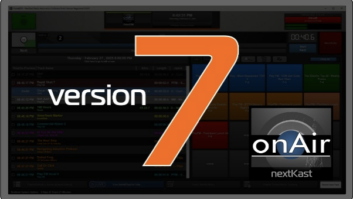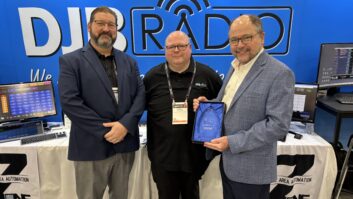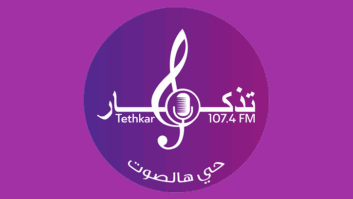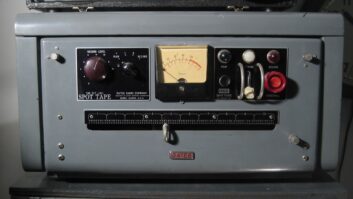Circa 1997, there were two simple and inexpensive Windows-based radio automation programs that were available to the average Joe: Raduga and Radio Wolf.
(click thumbnail)
Both were readily obtainable right off the Internet, and anyone with a decent music collection on his or her hard drive could be playing sequenced audio in no time.
Unlike pricier programs of the day, both were in a range where almost anyone could buy one just for giggles.
Of these two, Radio Wolf has all but vanished, leaving Raduga left to mature, develop new features and slug it out with the upstart programs found on the Web today.
For $649, Raduga can handle simple music automation tasks for a broadcast or Webcast station, including overnight or weekend music management and time context-sensitive events such as IDs, quarter-hour sweepers and simple promo rotation.
Raduga does not stop at WAV and MP3 file playback. The program also can take on WMA and WMV Windows Media files, MPEG and AVI video files, MIDI music files and a live mic or line input to the soundcard.
Product CapsuleThumbs Up
Stable and functional
Plays variety of file formats
Time-sensitive scheduler
Uncomplicated interface
Thumbs Down
Pricey, given the features it lacks
Jingle buttons inconspicuous
Price: $149 to $999; $649 version reviewed here
For more information on Raduga, contact the Spry Group in Ohio at (513) 887-0714 or visit www.raduga.net
Developer William Spry and the Spry Group have done some work on this baby since it was first put on the Net to see who would nibble.
Don’t expect a dedicated voicetracking module or music scheduling plug-in included in Raduga. Heck, except for its ability to merge with Natural Log, don’t even expect an easy way to create a commercial log with the program.
Raduga is just what it looks like – an easy audio playback program with a straightforward interface that can be loaded and driven by staffers who don’t have a lot of computer smarts.
In spite of what it has going for it, Raduga risks being outclassed by similar programs offered for less cash and with more features. Shop carefully on this one; you may suddenly want rudimentary music scheduling or voicetracking capabilities a week after you purchase Raduga.
I tried Version 3.5; Raduga is now up to 3.6.
Somewhere over the… Raduga?
“Raduga” is the Russian word for rainbow. Amusingly, the Spry Group instead uses an exploding CRT device as a logo, no doubt in tribute to the Russian-made Raduga television set that once had a reputation for self-immolation.
The single screen, shown in Fig. 1, contains all there is to know about Raduga. To the left are three playback slots. The uppermost one shows the cut previously played by Raduga. The one below shows the cut currently playing, and underneath is a counter showing remaining time and the upcoming cut.
Underneath is a Directory Tree showing folders where music may be held. The idea is to click and drag a cut from the directory tree window to the Master Playlist on the right. Once a list is prepared, hit the “L” key on the keyboard to clock out the total runtime of the playlist, click the green Play arrow in the lower left corner and you are on the air.
Overlap points for seamless segues can be set in two ways. One, by setting a global default segue point that affect all audio events – say 2 seconds – so all songs, liners and promos trip the next event two seconds prior to the end of the file.
The second way is to add a tilde (~) and a number to the name of a song file. The number indicates the segue point in seconds. So a file name such as:
Creedence_BadMoonRising~3.MP3
will cause Raduga to trip the next audio event three seconds prior to its end.
Simple, foolproof and efficient. Radio itself should be so uncomplicated.
Time has come today
Of course, any inexpensive audio program out there can do nonstop playback. Part of Raduga’s appeal is in its implementation of scheduled events that commit certain audio files to play at specific times of day.
Actually, I wish more programs made it this easy. Down in the lower right, the Upcoming Event box shows what is on deck for scheduled playback that particular hour. Hitting the Schedule icon opens an edit window allowing you to add items you wish to be played, either hourly or daily.
This does not take the place of a well-designed log scheduler, but if you absolutely need to have an ID played straight up, or a quarter-hour liner-guy announcement at :15 and :45, this is where to do it.
The scheduler also can be set to stop down for a live event. If you type 180.live into a field, you have a three-minute pause to fit in a live remote or a newscast.
You may set the scheduler to delay playback until the end of an event already playing (desirable) or have a cold cutoff of the song on-air to make way for the scheduled event (rather abrupt).
Depending on several conditions – cheap soundcard, lack of RAM, amount of MP3 compression or slow processor – you may experience clicking or dropouts when such a hard-slam segue occurs. I ran Raduga on an older Dell Optiplex GX1, based around a 266 MHz Pentium II and encountered this fairly frequently. My advice: don’t use a feeble machine.
Raduga need not be an automation-only program. It is a capable live-assist machine as well. Load a playlist, select “Manual” in the window in the bottom toolbar, and the day’s music schedule is at your disposal.
Lining up music this way lacks the visual appeal of similar software packages such as Web Jockey or DigiLink Free, but gets the job done.
One lament along the lines of live assist: There are nine “jingle keys” along the top toolbar that let you fire off whatever audio events you wish to load into them via the mouse or the number keys.
My dissatisfaction comes from the small number of keys to play with, how tiny and inconspicuous they are, and a lack of labels that obligates you to memorize what event you wish to play. The name will appear if the cursor is floated over the icon, but is there really anything wrong with nice big buttons with names on them?
A point of confusion in the Master Playlist window: If you get the itch to move one song to a higher point in the list, you may click and drag it. But as you may see in Fig. 1, the highlighted audio event is made obvious by the blue bar.
Raduga assumes whatever event is highlighted blue is the event now airing. If you move a tune to a new position, be sure you reposition the blue bar to where it belongs.
And don’t double-click the blue bar, for that will immediately segue into the highlighted song.
Raduga makes good use of DirectX compatibility and has a plug-in area to customize its operation. Scare up a good shareware compressor-limiter plug-in and you have instant on-board processing right on your soundcard. Find a neat multiband plug-in and process your own ready-for-air sound without resorting to external gear.
According to the developer, a new DirectX plug-in is available for $79, which performs an AGC function to keep audio as near to 0 dB as possible.
Just remember that the Live input to Raduga is unaffected by the DirectX insert. Plug in a microphone and you will get loop-through mic only without processing. So if you were hoping for a Boss Jock reverb effect on your old Sennheiser, you will have to set up a rackmount reverb box.
You may voice track with Raduga, but it requires building a mini-playlist and juggling overlap times on songs. While it gets the job done, it is somewhat cumbersome.
Tricked out
Raduga need not be a radio-only device. I intend to try out the program at my community pool this summer, tricked out with my summertime oldies MP3 collection, tied into the PA system and programmed to make relevant announcements at proper times.
Need a simple and dependable in-store or phone announcement device? Raduga pulls it off nicely, though relatively expensively. The same goes for Webcasting; Raduga can upload song information to Live365, assuming that is the channel of choice for a particular Webcaster.
According to the developer, there is a utility available that will print the name of the song that is currently playing to a TXT file. This TXT file can then be uploaded to any Web site to provide that information to viewers/listeners.
Indeed, in my opinion, the one thing holding Raduga back from being embraced more is its price: In a world filled with $399 playlisters and free voicetrackers, $649 seems steep for a non-mainstream product, especially given the features it lacks.
If the price were pulled back to, say, $400, and add-ons such as a scheduler or a music rotator were thrown in, perhaps Raduga could gain a lot more visibility and do battle in the arena now occupied by products from BTSG, Quic-Pix and Auto-Mate. As it is now, you may purchase a separate music scheduler for Raduga for an additional $349.
A prettier GUI would not hurt, either. There is no shame in using a product that is functional in appearance, but a little sparkle would not be a bad thing.
Need a different feature set than what is offered now? Raduga 3.6 is available in different flavors from $149 to $999. All editions are licensed by a license key (serial number), provided at the time of sale. Dongle licensing is an option.
With the proliferation of Webcasters and LPFMers, and with remaining small stations needing to streamline, there is a demand for a product such as Raduga. To the company’s credit, a fine user forum is maintained on the multilingual Web site to discuss problems and exchange tips.
Raduga was one of the earliest low-cost automation software programs out there, it retained its visibility long after Radio Wolf became hard to find, and new features are thought up for it all the time.
Pull down a demo from www.raduga.net and see if it’s right for you.








